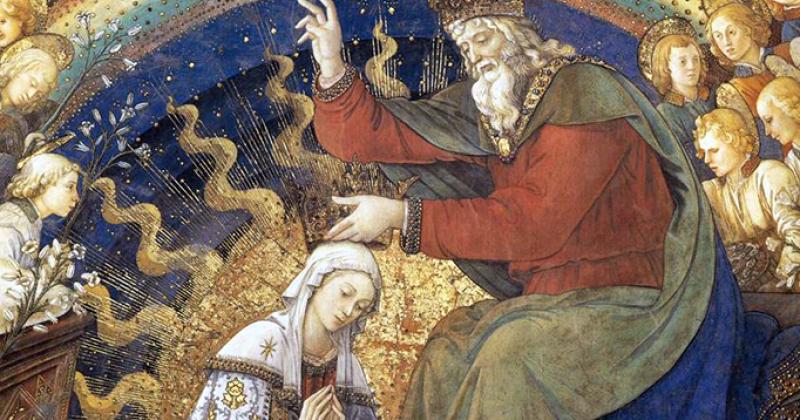Pope Pius XII established Aug. 22 as the Memorial of the Queenship of Mary in 1954; but Mary’s role as queen over the universal Church finds its roots in the Scriptures.
At the Annunciation, the archangel Gabriel announced that Mary’s Son would rule forever on the throne of David.
At the Visitation, Elizabeth called Mary the “mother of my Lord.”
The Old Testament foreshadows this queenship of Mary, by teaching us about the honor accorded to the Queen Mother in Israelite society. In his book Hail, Holy Queen: The Mother of God in the Word of God, theologian Dr. Scott Hahn writes and speaks about the “Queen Mother,” called the “gebirah” in Hebrew. In traditional Jewish life, the “gebirah” occupied a unique and powerful position throughout the history of ancient Israel’s monarchy. When the Queen Mother, or gebirah, entered the room, the king would rise to his feet as a sign of respect; and the king always acceded to his mother’s wishes.
For example, Solomon crowned his mother Bathsheba, the “Queen Mother” who sat at his right side. In all, through Israelite history there are 16 “Queen Mothers.” It is this Queen Mother, who typically ascends to the throne after menopause, who exerts the greatest influence on the king.
In Hebrew culture, even if the king were deposed, even if he died, the Queen Mother would continue to rule from her throne. She played an important role in leading the songs and worship; but she also was the king’s “wisdom counselor,” involved in political, military and economic affairs of court. In fact, ancient records show that in some instances, the Queen Mother even dared to oppose the king on issues of state.
Proverbs 31, the only chapter of the Bible that some believe to be written by a woman, was penned from the perspective of a Queen Mother offering instruction for her son — preparing him to accede to the throne and to select a proper wife.
In 1 Kings 15:13, Jezebel, wife of King Ahab, was an evil queen in the rebellious northern kingdom of Israel. According to Old Testament scholar Fr. Roland DeVoe, one significant cause for the disruption and unrest in the northern kingdom at the time of Jezebel and Ahab was that there was no Queen Mother. The lack of “dynastic stability” — the history of one group being overthrown by another — meant a lack of continuity in the culture.
As was the custom in Israel, Mary was predestined to be the Queen Mother of Jesus. Since Jesus was to be King of all creation, his mother Mary — in dependence on Jesus — was to be his Queen. Since Jesus took his earthly flesh from his mother Mary, it was only fitting that her flesh, too, should have been preserved from the stain of original sin.
Mary was acting in her role of Queen Mother when, at the wedding feast at Cana, she turned to her Son for help — and then when she instructed the steward, “Do whatever He tells you.”
From the Dogmatic Constitution on the Church, 69:
“Let the entire body of the faithful pour persevering prayer to the Mother of God and Mother of men. Let them implore that she who aided the beginnings of the Church by her prayers may now, exalted as she is in heaven above all the saints and angels, intercede with her Son in the fellowship of all the saints. May she do so until all the peoples of the human family, whether they are honored with the name of Christian or whether they still do not know their Savior, are happily gathered together in peace and harmony into the one People of God, for the glory of the Most Holy and Undivided Trinity.”
